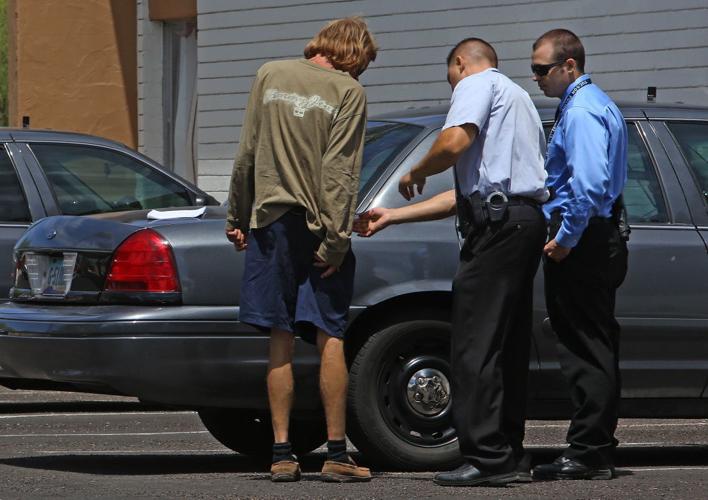One judge was demanding, the other was indulgent.
Both ended up in the same place, though — granting restraining orders that involved members of the Tucson Police Department’s Mental Health Support Team.
The flurry of court action over the last two weeks has troubled the department and exposed a couple of distinct issues in the local justice system.
One involves the mental-health unit, a team on the cutting edge of law enforcement that has existed since 2014.
It turns out that when officers are assigned to a unit like that, they respond to calls concerning the same mentally ill people over and over, year after year. And a few of those people don’t like it. They may get angry at the individual officers who seemingly pry into their lives, or obsess about the officers.
The other issue is the variability in the way judges may apply the standards for issuing these injunctions — especially when they involve police officers. Imagine if you were worried about being arrested by certain officers, but you could simply fend them off by getting an order that forces them to stay away from you. Nice, right?
This all started when Jason Winsky, Todd Schladweiler and Dustin Dial formed the initial TPD mental health unit four years ago.
By early 2015, the frequent contact the officers were having with one man was already leading to trouble. That man, Shawn E. Jackson, figured out Dial’s mother’s phone number, called her at about 12:50 a.m. on March 30, 2015, and said he was a colleague who needed Dial’s cellphone number, a presentence report for Jackson says. Jackson then left a 16-minute voicemail on Dial’s cellphone that included “veiled threats,” the report says.
It was part of a pattern of behavior that led Jackson, now 47, to be convicted of felony stalking against Dial, along with aggravated harassment against a former roommate. “The persistence of his actions and the lengths to which he went to harass the victims is alarming and suggest he poses a foreseeable risk to the community,” the report said.
Jackson pleaded guilty but insane to the charges and was sentenced in July 2017 to 75 days in the Arizona State Hospital.
I called and spoke with him Friday morning, and he said he would call back within 30 minutes, but he did not, and he didn’t respond to a later call.
At the time of the 2015 crimes, Jackson already had a long history of asking judges for injunctions against harassment against people he said were after him. Between 2010 and 2013, Jackson requested seven injunctions, two of them against employees at a staffing agency, and had five approved by judges, Pima County court records show.
So it was perhaps predictable, given that history and repeated contacts with the mental-health unit, that Jackson would seek injunctions against harassment against the two officers he’d seen the longest, Dial and Schladweiler.
On Aug. 20, he filed five petitions in Pima County Justice Court against those two, plus two attorneys who had been involved in previous cases and a fifth man identified only as Christian.
The time frame he gave for the officers’ harassment was July 2014 to present, and the written justification was simply “Stalking, harassment, violent.”
Injunctions against harassment are a type of restraining order that allow judges to tell a certain individual to leave the petitioner alone. One of the key differences from orders of protection is that injunctions against harassment are for non-family members. Using the injunction tool against a police officer doing his job, though, was inventive.
I spoke Friday with Paul Simon, who retired in 2016 after 20 years as a justice of the peace, and he told me he couldn’t recall hearing of an injunction against harassment being requested against a police officer in his professional role.
He also explained that the standard is relatively low for obtaining these injunctions. The petitioner files a complaint and usually sees a judge within an hour, without the respondent present. Then the petitioner must only show through his or her testimony that it is more likely than not that the respondent harassed the petitioner at least twice in the last year.
“Generally they are just a few minutes long,” Simon said of these initial hearings. “If they’re going to take more than a few minutes, that suggests there should be a hearing (with both sides present) before you grant an inunction, which is your job as a judge.”
On Aug. 20, while hearing Jackson’s five requests, Justice of the Peace Keith Bee let Jackson ramble for most of the 30-minute session. Jackson claimed one local attorney had made thousands of calls about him to third parties, lying about the outcome of a legal case. He said Dial and Schladweiler had harassed him in person and by phone, but the dates and details of the incidents were vague.
“I want the order to be that they cannot contact anyone — not my girlfriend, my kids, anyone in my family or my profession,” he said. “I would like it to be no contact with anybody in my life at all.”
Bee would not consent to that broad an order, but he did approve the five requested injunctions, even the man whose last name was unknown, warning Jackson in court that the officers and other respondents would probably challenge them.
The injunctions sparked a whirl of activity in the Police Department and the attorneys’ offices. TPD legal adviser Rebecca Cassen had to ensure that the officers were still allowed to carry weapons, which is sometimes prohibited by these orders. They also had to figure out how to ensure officers affected by the orders weren’t dispatched to calls where Jackson might be.
Deputy Police Chief Chad Kasmar criticized Bee’s decision to issue the injunctions as “beyond concerning and extremely disappointing.”
In fact, it was the second puzzlingly generous decision by Bee this year on requests for injunctions against harassment. In March, Bee granted an injunction to a Tucson couple who ran a sports-oriented high school and were accused by state authorities of consumer fraud. The injunction was against a sports journalist from Pinal County who had first reported on the couple’s questionable practices. Bee ordered him not to write about them on Twitter, but rescinded the order after a hearing with both sides present.
Jackson’s requests were not the end of the injunctions. On Wednesday, a cadre of TPD colleagues, including Dial, went to court seeking their own injunctions against harassment against Jackson and another man. It happens that recently a different person seen by the mental-health team showed up at Dial’s home.
Justice of the Peace Paula Aboud made the officers work for it.
“Everyone who comes here for an order of protection perceives threats,” Aboud told Dial. “But you have to be able to articulate, and you have to have two or more incidents to obtain the order.”
Momentarily, Dial gave up in frustration at Aboud’s questioning, so much more demanding than Bee had been to Jackson the previous week. Then a fellow officer’s testimony helped Dial win the injunction after all.
Simon, the retired judge, told me often judges don’t have enough information about a petitioner to question whether he’s an abuser of the system or has a legitimate complaint.
“They don’t have the information as to whether this same person has filed against five other people, or maybe aganst this same guy in city court,” Simon said. “We don’t necessarily have the picture of what’s going on.”
Of course, five requests on the same day was extremely unusual.
The officers and attorneys now have a hearing scheduled for Tuesday, at which both sides will be present. I doubt the injunctions will survive.
But we still need to ask how we got to this point, where officers have been harassed in their homes for doing mental-health work, and judges are handing out injunctions without demanding specific testimony and evidence of harassment.





